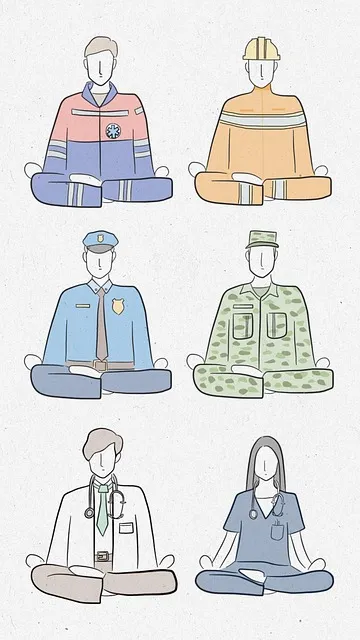Media portrayal significantly shapes public perceptions about mental health, often perpetuating stereotypes. Wheat Ridge Kaiser Permanente (WRKP) addresses this issue by providing nuanced insights into emotional regulation and mental wellness through training for their providers. They aim to bridge the gap between media misconceptions and accurate representation, ensuring patients receive empathetic care tailored to their needs. WRKP's proactive approach fosters open discussions about mental health struggles and encourages access to evidence-based treatments, challenging the status quo of media portrayal. This includes collaborations with diverse individuals from WRKP mental health locations for authentic portrayals in media, emphasizing recovery narratives to dismantle harmful stereotypes and foster a more supportive society.
In an era where media plays a pivotal role in shaping societal perceptions, accurate representation of mental illness is paramount. This article delves into the impact of media portrayal on mental health awareness, highlighting disparities observed at Wheat Ridge Kaiser Permanente mental health locations. We explore strategies for enhancing accuracy and compassion in media depiction of mental illness. Additionally, we discuss the critical roles healthcare providers and community support networks play in fostering positive narratives that challenge stereotypes and promote understanding.
- Understanding the Impact of Media Portrayal on Mental Health Perception: Exploring the Gap at Wheat Ridge Kaiser Permanente
- Strategies for Accurate and Compassionate Mental Illness Representation in Media
- The Role of Healthcare Providers and Community Support in Shaping Positive Narratives
Understanding the Impact of Media Portrayal on Mental Health Perception: Exploring the Gap at Wheat Ridge Kaiser Permanente

Media portrayal plays a pivotal role in shaping public perceptions about mental health. At Wheat Ridge Kaiser Permanente, a prominent healthcare provider with multiple locations dedicated to mental wellness services, the gap between media representations and reality is evident. While the entertainment industry often perpetuates stereotypes and skewed narratives, these Wheat Ridge Kaiser Permanente mental health locations offer nuanced insights into the complex landscape of emotional regulation and mental wellness.
By prioritizing cultural competency training for their healthcare providers, Wheat Ridge Kaiser Permanente bridges the gap between media-driven misconceptions and accurate representation. This proactive approach ensures that patients receive empathetic, effective care tailored to their unique needs. Through such initiatives, they foster an environment where individuals can openly discuss their struggles and access evidence-based treatments, ultimately challenging the status quo of mental health portrayal in the media.
Strategies for Accurate and Compassionate Mental Illness Representation in Media

Media plays a powerful role in shaping societal perceptions, especially when it comes to mental health. To challenge stigmatization and promote understanding, media outlets must adopt strategies that ensure accurate and compassionate representation. This involves employing diverse and authentically portrayed characters with mental illnesses, allowing for nuanced storytelling that reflects the complexity of these conditions.
Wheat Ridge Kaiser Permanente mental health locations can serve as valuable resources for both accurate depiction and real-world context. By collaborating with healthcare professionals and individuals with lived experiences, media creators can gain insights into the latest treatments, therapies, and support systems available. This collaboration not only enhances the accuracy of representation but also fosters empathy among viewers, encouraging open conversations about mental health. Additionally, focusing on recovery narratives and emphasizing resilience can help dismantle harmful stereotypes, promoting a more inclusive and supportive society for those facing mental health challenges.
The Role of Healthcare Providers and Community Support in Shaping Positive Narratives

Healthcare providers play a pivotal role in shaping public perception of mental illness through their interactions with patients and community engagement initiatives. By fostering an environment of cultural sensitivity in mental healthcare practice, professionals can ensure that narratives around mental health are diverse, accurate, and positive. This involves recognizing and addressing stereotypes often perpetuated by media representations, offering resilience-building techniques to individuals and communities, and promoting open dialogue about mental well-being.
Wheat Ridge Kaiser Permanente mental health locations, for instance, have been at the forefront of these efforts, integrating emotional well-being promotion techniques into their services. They actively involve community members in programs that challenge stigmatized perceptions, encourage early intervention, and celebrate recovery stories. Such initiatives contribute to a more nuanced understanding of mental illness, reflecting the reality of diverse experiences and journeys towards healing, beyond what is often depicted in media portrayals.
Media representation plays a pivotal role in shaping societal perceptions about mental health. The gap in accurate portrayal at Wheat Ridge Kaiser Permanente highlights the urgent need for more nuanced and compassionate storytelling. By adopting strategies that emphasize authenticity, engaging with healthcare providers, and fostering community support, media can contribute to reducing stigma and enhancing understanding of mental illness. These efforts are essential steps towards creating a more inclusive and supportive environment for those seeking help at Wheat Ridge Kaiser Permanente mental health locations and beyond.






